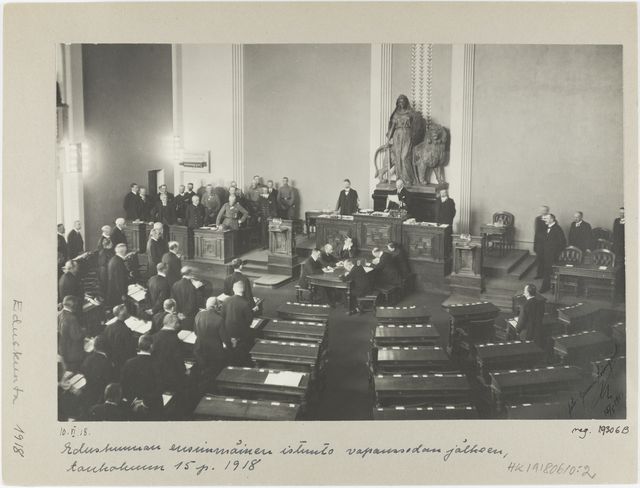The Constitution Act of 1919 specified that Finland would become a republic and served as the nation’s first constitution. The ratification of Finland’s form of government laid the foundations for the country’s modern democracy and highly functional society.

Photograph: Hanna Oksanen
When Finland declared its independence in 1917, it adopted the Constitution Act from the period of Swedish rule in the late 18th century. Even though the proposal to declare a republic was made immediately after the declaration of independence, the Civil War complicated the process.
”The Swedish-era constitution was naturally felt to be outdated for current conditions, and a new form of government was required. In practice, there were three options on the table: a socialist republic, monarchy or non-socialist republic”, says Vesa Vares, Professor of Political History at the University of Turku.
”Contrary to what people think today, a non-socialist republic did not enjoy any overwhelming degree of support. If the Reds had won the civil war, Finland would have become a socialist republic. After the White victory, Finland was close to becoming a monarchy, and we even elected a king. The monarchist project nevertheless foundered when Germany lost the First World War, and so Finland opted to become a non-socialist republic.”
A balance of power for all political opinions
A non-socialist republic was largely what the centrists had wanted, but it also had elements that catered to the left and right.
”As a form of government, the non-socialist republic created a balance of power in which Parliament, the President and the government all had significant powers. In a European comparison, Finland’s Constitution Act actually afforded the President an exceptional amount of power”, Vares says. ”All three political camps were able to introduce features they wanted into the system.”
It can be hard for a normal citizen to understand the impact of the Constitution Act of 1919 on our everyday life today.
”The Constitution Act regulates the political balance of power: it lays down the rules according to which laws are enacted, for example. And our daily lives are governed by laws that set the framework for economic activity, social rights and education. Of course, the Constitution Act also includes a mention of the fundamental rights of citizens”, Vares says. ”So, to put it in a nutshell, the Constitution Act provides the chips with which Parliament, the political parties, the government and the President play.”

Photograph: Gunnar Lönnqvist 1918. The Finnish Heritage Agency – Musketti, Historical image gallery.
The Constitution Act of 1919 – the foundation for the best-functioning state in the world?
Finland has been called the most functional country in the world. Could it be explained by the Constitution Act of 1919?
”On the contrary, I think that the constitution and Constitution Act are products of a political culture leaning towards democracy. It also helps that taking everyone into account is considered a self-evident fact of life. In other words, the political culture creates a form of government in its own image”, Vares answers.
”Even if Finland had ended up a monarchy, our lives might not be so different today. It would not have shielded us from outside influences any more than our current form of government has. After the Second World War at the latest, the possible king’s powers would most probable have been curtailed to a level similar to the other Nordic Countries.”
The Constitution Act and Constitution were updated to meet modern needs in 2000.
According to Vares, the most significant parts of the Constitution Act of 1919 are the division of powers and taking everyone into account. It could be that this product of the political climate and culture of that age is one of the pillars on which the functionality of Finnish society rests.

